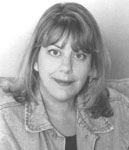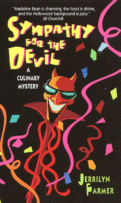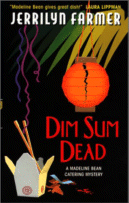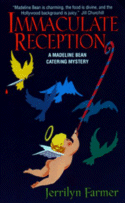A Conversation With Jerrilyn Farmer
by Claire E. White
Award-winning mystery novelist Jerrilyn Farmer grew up in Lincolnwood, Illinois, a suburb of

|
In addition to her work on game shows, she wrote the Marry Me! interview specials starring Christina Ferrare for the Family Channel. For these shows, Jerrilyn interviewed such celebrities as Dennis Franz, Jane Seymour, Trisha Yearwood, Regis and Joy Philbin, Robert Urich, and Roma Downey about their love lives. Jerrilyn has also written live comedy specials for Dana Carvey and Martin Short, as well as material for many members of the cast of Saturday Night Live.
Turning her attention to fiction, she took a course at UCLA Extension taught by mystery author Melanie Johnson Howe. She then finished her first novel, Sympathy for the Devil, which stars caterer Madeline Bean, who, when she's not concocting gourmet delicacies finds time to solve the occasional murder. Sympathy for the Devil became a finalist in the "Malice Domestic" competition sponsored by St. Martin's Press, for the Best First Traditional Mystery. Soon after, Jerrilyn inked a book deal with Avon Books. Sympathy for the Devil debuted to rave reviews, won the Macavity Award for Best First Mystery published in 1998, and was honored with nominations for the Agatha Award and Anthony Award, as well. The second book in the series, Immaculate Reception -- in which the visiting pope winds up locked in an L.A. men's room -- was nominated for a Lefty, awarded to the year's funniest mystery, and an Agatha Award for Best Mystery Novel of 1999. It was followed by Killer Wedding in 2000, and her latest release, Dim Sum Dead, in which Maddie and company enter the world of old Hollywood, mah-jongg and murder. It's a funny, witty, and sophisticated story which has some wonderful characters, especially the aging Hollywood divas who have some pretty hot secrets to hide.
Jerrilyn serves on the Board of Mystery Writers of America's Southern California chapter and teaches mystery writing at UCLA Extension's Writers Program. She lives in Southern California with her husband and two children. When she's not writing, you might find her whipping up a delicious meal, spending time with her family, surfing the Net, or traveling to a mystery writer's convention, such as Left Coast Crime. Jerrilyn talked with us about her latest book, what it was like writing for Jeopardy and for Dana Carvey, and the most important thing that an aspiring mystery writer must do.
What did you like to read when you were a little girl? Did you have an interest in writing when you were very young?
I loved The Secret Garden and a lot of historical fiction. I was a big Jane Austen fan. When I was very young, I read the Cherry Ames series, but somehow never got introduced to Nancy Drew. My reading was pretty eclectic and haphazard, but I always had a book going and just purely loved reading.

|
How did you first get involved with writing for Jeopardy?
I had already written questions for a game show on ABC which had recently been canceled. I saw an article in Variety that Jeopardy! was going into production and I simply called and spoke to the executive producer. At that time, he asked me to write several sample categories of answers & questions, and I was hired.
What was a typical day in the life of a writer for a game show like? How much pressure was there on the writers to perform?
You start work at around ten in the morning. This was a great plus for me. You wear jeans. Another plus. You lounge around with other iconoclastic, witty scoundrels who make up the writing staff. You joke. You realize you haven't finished writing your quota of material for the day so you hightail it into your office (filled with mid-fifties furniture, in constant use over the decades) in the deep catacombs of some ancient studio lot. You turn on the computer and open up your research materials and write.
The trick to writing a game show like Jeopardy! is understanding how to give more than one clue in one short "answer". For example, if the category was "Famous Mystery Authors", the "answer" might be "Her best-selling series has taken Kinsey from A to O". This would be too obvious, of course, to a true mystery fan. But we write for the general public. This might be placed in the easiest spot, or the second to easiest. One clue is the category. Another is the "she", plus "bestseller", plus "Kinsey", plus the reference to the alphabet. And, of course, it has to be written in the fewest possible characters, because Jeopardy! uses graphics and there are limits.
| "Finish your first draft. It's the greatest high I know. You will never get published if you don't complete the manuscript. My second bit of advice is, learn to love revising and rewriting. This is the crafting part, the part where you can fix it and polish it like a gem. If you hate revising and avoid it, you are not learning and improving and your work will certainly suffer." |
By two it's back to the office and there's a memo on your desk suggesting a writers' meeting at 3:30. You boogie and finish up all your remaining categories in the remaining time.
At four, you sit around with the producer and discuss your material. This is different on different shows. Some discuss, some don't. You help put together a week's worth of boards, and get back questions that must be rewritten. For example, they use 4 of your questions for "Famous Mystery Authors", but one is too obscure (Who is Jerrilyn Farmer? Obscure!?). Or one answer--Sue Grafton--has been used recently in another show (perhaps the category 2 weeks back had been "Sue Me" and some other writer turned it in).
At five, you're back in your office, filling in holes, creating replacement questions for your incomplete categories. Depending on your source material, you find second sources. Turn them in and call it a day.
But there can be times, especially the first three months of a new start-up series, when the work can go on until nine or ten every night. The quota for material can be intense because they need to build up a backlog of questions.
The stress, generally, comes in the form of how quickly you can get into the groove of any given show's style of question. Some find this daunting. Some writers are not built for writing certain kinds of material. Some cannot write quickly enough. Some don't have a feel for what "America" finds easy, medium, and difficult. Some don't have a broad enough base of trivial knowledge and a quick enough recall. Some can't handle the politics of show business. Some can't research worth beans. Write an incorrect question & answer and you are quickly shown the door. Write a hundred questions a day for five years, and it's easy to slip.
But stress also comes from the strange assortment of jerks and fools with whom one sometimes must work in Hollywood. And, unfortunately, many of the egos come in size XXL and tempers flash hot here, as well.
What was it like writing comedy for Dana Carvey and John Lovitz? What was the greatest challenge writing for them?
They were both terrific. I have a lot of fun writing comedy. I wrote sketches featuring their most popular characters, so my challenge was to get the voices right. For Dana, I wrote him playing George Bush, Sr., the Church Lady, the Cranky Old Man, and Hans of Hans & Franz. Of course I wrote a sketch for Jon playing his famous liar character, and also a parody of Gilligan's Island where Jon played the millionaire and Cheri Oteri played MaryAnn. I think Tim Meadows played Gilligan in that one. They were hilarious. Actually, in one scene featuring The Ladies' Man, Tim Meadows plays this sleazy radio romance advisor who talks to phone-in callers. In that one, I got to act (off-stage!) and do the voice of the woman who calls in with her problem.
But the best, and most frightening, time is usually when we do the first table read-through of a script. When I first heard Dana saying my words in his Church Lady voice, it was fantastic. And the coolest compliment was that he laughed and didn't change a word.
What led up to the publication of your first mystery novel, Sympathy for the Devil?

|
What was your reaction when you found out that the book had been nominated for an Agatha and an Anthony Award, and had won the Macavity Award?
There was screaming. Unbridled screaming.
The lead character in the series, Madeline Bean, has really struck a chord with readers for her intelligence, humor and fabulous cooking skills. How did you create the character of Mad Bean?
Thank you so much. I was most interested in writing about my experiences working in Hollywood, but I wanted to do it obliquely. I didn't want to do a traditional glossy Hollywood set-piece. I chose a profession where my protagonist could be a business-woman whose work brought her into contact with a wide variety of Hollywood types. In this way, I tried to construct a softer-boiled amateur sleuth series set in the big, bad urban world of Los Angeles.
Another great character is Arlo, Madeline's on-again, off-again boyfriend: he's both funny and infuriating, at times. Is Arlo based on anyone is particular?
What is it they say? I could tell you, but then I'd have to kill you.
Arlo is not unlike many, many men I know here. He's attractive and smart and funny and successful. That often means these guys don't necessarily have to work on their relationship skills. But hey, many machinists don't really work on their sensitivity levels, either. So maybe it's just my way of presenting the limited choices in hetero men a girl's got here in L.A. And really, I think Arlo is kind of cute--just not a guy one should ever think about marrying.
How would you say Madeline herself has developed over the first four books in the series?

|
For example, Madeline started out believing that while she might not be in control of everything in her life at the moment, if she worked harder she could get it all together. Now, she's beginning to discover the price to pay for thinking it's possible to be in total control. The fun, as her creator, is making these lessons reverberate on many levels, from her work as a party planner, to her relationships with friends, to her love life, to her discoveries as she searches for answers to a given mystery.
One of the satisfactions of writing a growing series is to hear back from fans who have followed Maddie's evolution. I am very gratified that they are enjoying these developments and continue to find Madeline and the others getting a bit deeper and even more believable.
Your books always have an interesting historical twist, such as the Vatican mystery in Immaculate Reception. How do you do your research for these historical parts of the mystery?
I love to research and from my game show writing background, I've developed and
| "Most creative people I know find the idea of curbing freedoms of expression to be extremely objectionable. Parents simply must use good judgment in what they permit their children to see and read. Parents who choose to let their children and teens watch more mature content have the responsibility of sitting with those kids and explaining to them the context in which that material should be regarded." |
For Immaculate Reception, I decided to bring the pope to Los Angeles and have Maddie cater the city's breakfast reception for the pontiff. At that time, newspaper articles seemed to jump out at me and beg to be woven into my plot. One told of an enticing Vatican mystery from the 30s about a missing papal encyclical denouncing the Nazis. Another described a WWII theft of a priceless Russian treasure. It just caught my imagination, and I tied the two together and built them into the plot.
In the same way, I met an enchanting man by chance on a trip, and his own story of smuggling gems out of Africa became part of the plot of Killer Wedding. Of course, I was then off to do a lot of historical research about that area of the world at the time, but that was just wonderful. And for Dim Sum Dead, I had the treat of studying the art of Chinese fortune-telling, using the tiles from the game of mah-jongg. I also learned about Chinese cooking. Like Madeline...
"I learned that each Chinese entree combines three to five colors, selected from ingredients that are light green, dark green, red, yellow, white, black, or caramel-colored. I also learned to balance the five flavors--bitter, salt, sour, hot, and sweet. A proper meal must be designed to maintain the balance of Yin and Yang forces that are vital to good health in the body, mind, and spirit."In the latest book, Dim Sum Dead, Madeline gets involved with a mystery which involves an old mah-jongg set and some deadly Hollywood secrets. What was your inspiration for this story?
Mah-jongg was a huge craze in the U.S. in the Twenties. Even today, it's an exciting, addictive gambling game. I love that it's played by everyone from old ladies to new fans like computer-gamers to Hollywood hipsters, alike. It was just the sort of territory Maddie and Wes come across in their world. And the chance to add Dim Sum (yum) to the story, along with a back story that travels to post-war Hollywood, as well as China, was enticing.
I really loved the part where Maddie meets the aging Hollywood divas (Catherine Hill, Eva James and friends) who play mah-jongg and dish the dirt. What prompted you to create these characters? Will we be seeing any of them again in future books?
I'm so glad you liked the old gals! They allowed me to impart some of the unique etiquette lessons a Hollywood insider needs in order to interact with Hollywood royalty, but which are seldom found in Emily Post. Of course, most of my friends and I have all sorts of sideways connections to these type of women. We all have our stories. I thought it would be fun to share a few. As for future books, we shall have to see if these grand dames insist on being included.
What do you enjoy most about living in Southern California? Do you ever miss the Midwest?
The people I know here, like me, most often came from somewhere else entirely. It's that kind of town. I think this makes a large pool of people who are brave enough to leave home and very often, talented enough and high-risk enough to want to try Hollywood. My friends here are terrific people. Of course, I must admit that like everyone, I love the weather. And I have a love/hate relationship with working in Hollywood and being part of this pop-cultural hub. My brother and parents had the good sense to follow me out to Southern California, and my husband's family has lived here for generations, so there is nothing dragging me back to Illinois except the prospect of -20 below zero wind chills. ;) But I had a lovely childhood in a fabulous city and despite the weather, I still love Chicago.
I'd like to talk about the actual creative process. What is a typical writing day for you like? Do you keep a set schedule?
I write at an immoderate pace. I spend several months investigating story ideas, doing research, gathering my thoughts, creating characters, and then I start. Once I'm in the writing phase, I write every day. I take my boys to school and then get to it. I usually write a chapter a day, everyday, until I finish the rough draft. My husband is a terrific guy, and he takes care of the boys on the weekends when this heavy-duty writing phase is in full gear. I work like this until I have a finished draft, and then I do revisions and rewrites which can go on for a considerable amount of time. For months, there are no birthdays celebrated, no volunteer work in the school library, no lunch dates, no parties, no guests, nothing social at all. I admire those who can write an hour or two every day of the year and maintain a real life, but I simply can't.
How has your training as a comedy writer affected your work as a novelist?
I was thrilled last year because Immaculate Reception was honored with a Lefty Award nomination. The Lefty is given to the Funniest Mystery of the Year at most Left Coast Crime mystery conventions. The nominees included Dave Barry, Donna Andrews (who won), Anne George, and Janet Evanovich. I was terrifically flattered to be considered in their company.
I do not think of my series as particularly "jokey" or "slapstick". I think the humor in my books comes from the characters as they react to the situations they're in and the people they meet. They have a witty, sly take on things, and they may share a certain offbeat sense of irony with their creator. But I also believe that comedy is all about timing, and that is partly something you are born with and raised with and partly a result of great training and long writing experience. In that sense, my comedy writing background does most likely come through in the humorous tone of the books.
As a wife, mother and novelist, how do you juggle all the different demands made on your time?
Sleep? Who needs sleep?
As a mother, what are your opinions on the amount of sex and violence currently available on television, computer games and books? Should this material be policed by our government, or should it be up to the parents to monitor what their children are exposed to?

|
Your books are known for their humor and snappy dialogue. How did you learn to write dialogue? What's the most important thing to remember when you are writing dialogue?
I was a theater major and began my career acting, so I learned about dialogue then and it stayed with me. Every speech has a purpose in moving the plot or furthering character development. Every speech must be motivated and honest to the character. If your characters are real and interesting, their dialogue will be too. And timing is key. Select the exact right words and then cut the words way down.
What is your advice for aspiring mystery writers?
Finish your first draft. It's the greatest high I know. You will never get published if you don't complete the manuscript. My second bit of advice is, learn to love revising and rewriting. This is the crafting part, the part where you can fix it and polish it like a gem. If you hate revising and avoid it, you are not learning and improving and your work will certainly suffer.
What's next for Madeline Bean and company?
I'm already hard at work on book 5, which I am calling Shoot the Chef, but may find a new title along the way. My current contract calls for another Mad Bean after that, so I had better get cracking and get back to work.
The Madeline Bean books are always filled with scrumptious foods and wonderful parties. If you had Mad Bean create a special birthday party event for you, what would you have her serve? (Cost is no object, of course!)
LOL. I must say, one of the most exciting and fun things I get to do these days is design the big launch party on the publication of each new book. I have this at one of my favorite old independent bookstores and I always go all out. Last year, for Killer Wedding, I ordered a 7 foot tall, tiered wedding cake. I found a perfect porcelain bride dancing with her groom for the top of the cake. In her hand, over his shoulder, she was reading a perfect miniature copy of Killer Wedding. I can be so nasty.
For Dim Sum Dead, I found a supplier who bakes custom fortune cookies in gourmet jelly belly flavors and bright beautiful colors. I got to write all the fortunes and had a ball doing them, imagining my friends (hundreds attend) in the palm of my hand--with me and my merciless fortunes controlling their fate. An example (a sneak preview, just for your readers)...
Cappuccino flavor Fortune cookie opens to reveal special Dim Sum Dead fortune: "Moved by action in Dim Sum Dead, you change careers and take pro mah-jongg world by storm calling self The Angry Fist of Mystery."
Return to the April 2001 issue of The IWJ.
More from Writers Write
